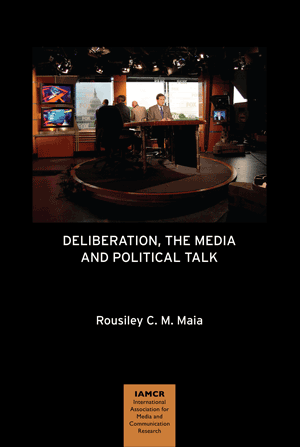Deliberation, the Media and Political Talk | |
|  | Quantity in Basket:none
Code: 978-1-61289-025-8
Price:$40.95
Title: Deliberation, the Media and Political Talk
Author(s): Rousiley C. Maia
Publish Date: September 2012
Format: Paper
| |
| In recent years democratic theory has taken a deliberative turn and one central question that needs to be answered is how to connect face-to-face conversations and deliberations in particular forums to broader discussions in the larger society. Working within the cutting edges of deliberative theories, this book surveys the role of the mass media in the deliberative system and investigates, through a set of empirical cases, a range of key problems in the media arena: the interplay between arguing and strategic maneuvering; public demands for accountability; emotional appeal for deliberation; tensions between agonistic and diplomatic deliberation; and the public construction of general claims. Adopting an integrative perspective, this book also looks at how affected people use published opinions to make sense of politics and produce bottom-up reasons, in addition to media-driven or top-down discourses in the public sphere. The general aim of the book is to show that the mass media have an important place in deliberative democracy and to enrich political and media theories with new findings.
“The mass media play a crucial role in shaping the public sphere, and so the prospects for deliberative democracy. Moving between sophisticated deployment of deliberative theory and compelling analysis of an intriguing set of cases, Rousiley Maia has written what should become recognized as the key work on deliberation and the media.”
—John Dryzek, Australian National University
“The author provides important insights into the complicated role of mass media for civic engagement in Brazil—an interesting comparison with the heavily studied cases of the United States and Western Europe.”
—William Gamson, Boston College
“Maia’s landmark book bridges the gap between normative theories of deliberation and empirical media research. Through a thoughtful review of the vast literature and a series of intriguing case studies she convincingly shows that the mass media do function as both a site and a resource for public deliberation. She thus puts mediated deliberation firmly on the agenda for readers in the fields of communication, political science, and political philosophy alike.”
—Harmut Wessler, University of Mannheim
Contents: Preface and Acknowledgments. INTRODUCTION. The Plan of this Book. PART I: INTEGRATING THEORETICAL PERSPECTIVES ON DELIBERATIVE DEMOCRACY AND MEDIA STUDIES. DELIBERATIVE DEMOCRACY: APPROACHING NORMATIVE CONTROVERSIES. Classic Deliberation. What Type of Communication Is Needed for Deliberation? Should Deliberation Follow an Open Procedure of Reason-Giving, Which Is Necessarily Incompatible With Self-Interest, Insincerity, Strategy and Bargaining? What Sort of Equality Is Needed for Deliberation? Is Deliberation Oriented Toward Simple Consensus,
Defined as Unanimous Agreement? FROM PUBLIC SPHERE TO DELIBERATIVE SYSTEM: LOCATING THE PLACE OF THE MEDIA. From Public Sphere to Deliberative System. Micro- or Macro-Deliberation? The Deliberative System. THE NEWS MEDIA AS A FORUM FOR CIVIC DEBATE. The Media System. Different Kinds and Levels of Constraints Applied to the News Media as a Civic Forum. An Integrated Approach to the Media System. MEDIATED DELIBERATION. What Is Mediated Deliberation? Variables to Observe and Measure in Evaluating Mediated Deliberation. PART II: MEDIATED DELIBERATION. THE INTERPLAY BETWEEN ARGUING AND STRATEGIC MANEUVERING: THE MEDIA DEBATE OVER THE 2005 REFERENDUM ON BANNING FIREARMS SALES. The Referendum on the Sale of Firearms in the Brazilian Democratic Context. Methodology. Participant Accessibility and Identification. Use of Arguments. Reciprocity and Responsiveness. Reflexivity and Reversibility of Opinions. Conclusion. DEMANDS FOR ACCOUNTABILITY. THE MEDIA DEBATE OVER THE BUS 174 HIJACKING. The Surveillance Function of the Media and Different Dimensions of Accountability. Media Coverage of the Bus 174 Hijacking. Political Accountability . Professional Accountability. Legal Accountability . Public Debate as a Means of Activating Political Accountability. Conclusion. EMOTIONAL APPEAL FOR DELIBERATION: THE HOMOEROTIC BOND IN SOAP OPERATES (Ângela C. S. Marques and Rousiley C. M. Maia). Alternative Communication Modes Triggering Self-Reflection. The Soap Operas and Stereotypes in Question: The Case Study. Methodology. “A Próxima Vitima” in Media Debate. The Two Lesbians of “Torre de Babel”. Conclusion. PART III: MEDIATED DELIBERATION AND POLITICAL TALK. POLITICAL TALK AND DEMOCRATIC DELIBERATION. Why Does Informal Conversation Matter for Deliberation? Why “Affected” People?
Ordinary Citizens: Making Sense of Published Opinions Together. DELIBERATION AND POLITICAL SOCIALIZATION: POOR WOMEN DISCUSS PUBLISHED OPINIONS ABOUT BRAZILIAN INCOME TRANSFER PROGRAMS (Ângela C. S. Marques and Rousiley C. M. Maia). Everyday Political Talk Within the Deliberative Process. Methodology. Interpretation of the Problem and Orientation of Actors Toward Mutual Understanding. The Production of Counternarratives. Disclosing Background Presuppositions. Assuming the Risk of Debating. Avoiding the Risk. Conclusion. BETWEEN SIPLOMATIC AND AGONISTIC DELIBERATION: MAKING SENSE OF CHILD DOMESTIC LABOR (Danila Cal and Rousiley C. M. Maia). Diplomatic or Agonistic Deliberation? CDL and PETID’s Discourse. CDL as a Public Problem. Methodology. Contesting the Network of Media Discourses on CDL. Beyond the Media Discourses. Conclusion. DELIBERATION ACROSS ARENAS? ASSESSING THE CONSTITUTION OF GENERAL CLAIMS ABOUT THE FUTURE OF LEPROSY COLONIES (Ricardo F. Mendonça and Rousiley C. M. Maia). Deliberation, Representation, and the Construction of General Claims. The Struggle of People Affected by Leprosy in Different Discursive Arenas. Conclusion. CONCLUSION. Mediated Deliberation. Mediated Deliberation and Political Talk. References. Media Materials. Author Index. Subject Index.
|
| |







